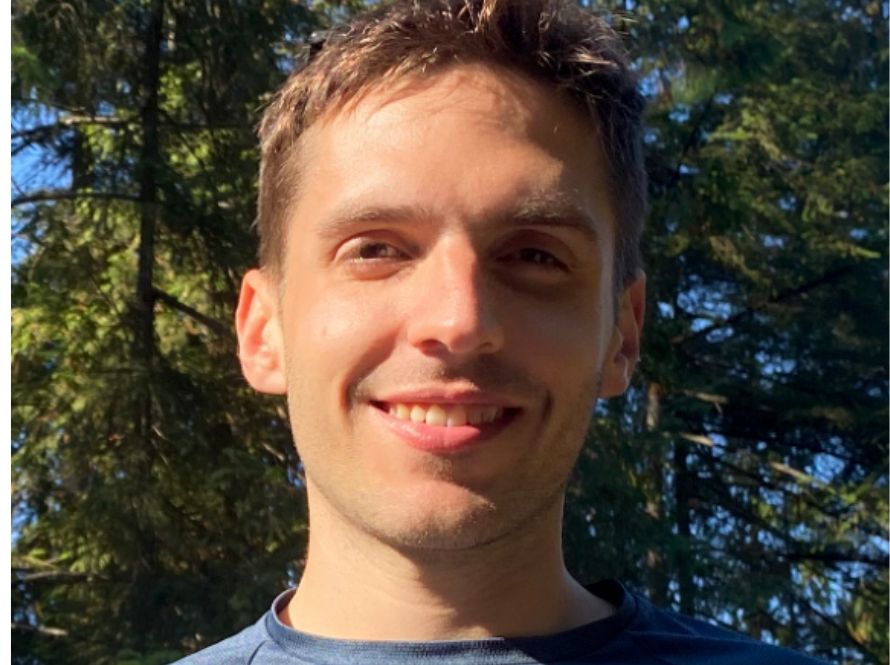Mark Fornace’s path to Berkeley Lab has spanned Maryland, Massachusetts, Illinois, and most recently Altadena, California—a community recovering from the Eaton Fire, where his partner’s house is still in remediation. Along the way, he has nurtured a passion for STEM (science, technology, engineering, and math) as well as history, linguistics, and other fields, bringing a broad perspective to his research.
“The fact that I launched into a STEM career was slightly happenstance,” said Fornace. “I’ve always been interested in physical chemistry and computational modeling, but I didn’t target a career in applied math. I became more interested in the theoretical underpinnings of those applied fields during my undergraduate years because I felt that rigorous applied math has a lot to offer: real-world methods that are theoretically grounded and proven to work well in practice seemed, overall, a very worthy endeavor.”
Now, as Berkeley Lab’s 2025 Luis W. Alvarez Fellow in Computing Sciences, Fornace will develop mathematically rigorous and computationally efficient methods—leveraging advanced frameworks like random matrix theory, tensor network methodologies, and dynamic programming algorithms—to tackle complex problems in chemical kinetics, with a specialization in the analysis and design of nucleic acid sequences (RNA and DNA).
By moving beyond existing heuristic approaches—methods that are based on experience or intuition rather than solid theory—Fornace aims to ground sequence design and analysis in robust mathematical principles. Ultimately, his goal is to create tools that experimentalists and computational biologists can use to accurately model, predict, and engineer nucleic acid sequences for applications in metabolic engineering, biological computing, and biochemistry.
As an Alvarez Fellow, Fornace will continue working in the Mathematics Group within the Applied Mathematics and Computational Research (AMCR) Division at Berkeley Lab, a group he joined as a postdoctoral fellow in October 2023. Before joining the Lab, he completed a PhD in Chemistry at Caltech, where his thesis focused on algorithms that model nucleic acid secondary structures. An important part of his research was distributed in the NUPACK 4 software suite, which is available to academics as an open-source Python package and web application. He completed his undergraduate studies at the University of Chicago with a dual degree in chemistry and geophysical sciences.
“Being named the 2025 Alvarez Fellow is quite an honor,” said Fornace. “This fellowship gives me the support to pursue ambitious ideas at the intersection of mathematics and chemistry, and it’s an exciting opportunity to contribute to the scientific community at Berkeley Lab.”
Established in 2002, the Luis W. Alvarez Fellowship honors the pioneering physicist who foresaw the power of computers in scientific research. Supported by the Department of Energy’s Office of Advanced Scientific Computing Research applied mathematics program and Berkeley Lab’s Laboratory Directed Research and Development program, the fellowship empowers exceptional Ph.D. graduates to take on grand challenges in computing sciences. Over two years, Alvarez Fellows collaborate on advanced computational and mathematical projects across fields like materials science, biology, energy, and genomics—building professional connections and launching impactful scientific careers at Berkeley Lab and beyond.
Watch Fornace present his previous postdoctoral research at the 2024 and 2025 Berkeley Lab Computing Sciences Postdoc Symposium.
About Computing Sciences at Berkeley Lab
High performance computing plays a critical role in scientific discovery. Researchers increasingly rely on advances in computer science, mathematics, computational science, data science, and large-scale computing and networking to increase our understanding of ourselves, our planet, and our universe. Berkeley Lab's Computing Sciences Area researches, develops, and deploys new foundations, tools, and technologies to meet these needs and to advance research across a broad range of scientific disciplines.


